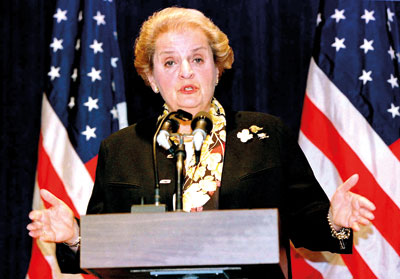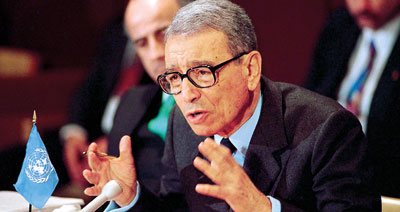Sunday Times 2
A legendary battle between a UN chief & a US envoy
UNITED NATIONS (IPS) – Madeleine Albright, a former US envoy to the United Nations and later the first female US Secretary of State, who passed away last week, had a long running battle with UN Secretary-General (UNSG) Boutros Boutros-Ghali, a former deputy prime minister of Egypt.
The independence of the Secretary-General is a longstanding myth perpetuated mostly outside the United Nations. But as an international civil servant, he is expected to shed his political loyalties at the UN’s revolving door at the entrance to the Secretariat building, when he takes office, and more importantly, never seek or receive instructions from any governments.

Reuters file photo: U.S. Secretary of State Madeleine Albright: "Accomplished her diplomatic mission with skill"
But virtually every Secretary-General—nine at last count—has played ball with the world’s major powers in violation of Article 100 of the UN charter.
Boutros-Ghali, the only Secretary-General to be denied a second term because of a negative US veto, and who passed away in February 2016, unveiled the insidious political maneuvering that goes inside the glass house by the East River.
That single negative vote was cast by Albright.
The US, which preaches the concept of majority rule to the outside world, exercised its veto even though Boutros-Ghali had 14 of the 15 votes in the Security Council, including the votes of the other four permanent members of the Council, namely the UK, France, Russia and China.
But Boutros-Ghali, who held the post of UNSG from 1992-1996, continued a strong contentious relationship with Albright.
In its tribute to Albright, the New York Times wrote last week that she was largely unknown until Bill Clinton took office as president in 1993 and named her chief delegate to the United Nations.
In 2016, according to the Times, Albright supported Hillary Clinton for the US presidency. And at an election campaign stop for the New Hampshire primary, Albright told a crowd: “There’s a special place in hell for women who don’t help each other.” The line went viral.
Over a four-year period, the Times said, she became a tough advocate for the global interests of the United States. But she and Clinton “clashed repeatedly with Boutros-Ghali over peacekeeping operations in Somalia, Rwanda and the Bosnian civil war.”
Albright, who apparently had a self-deprecating sense of humour, once recounted with relish an incident that reportedly took place at the Heathrow airport when she was running late for a meeting in London. She asked one of the Immigration officers: “Do you know who I am? “No”, snickered the officer “But we have doctors here who can help you figure that out”.

UN Secretary-General Boutros Boutros-Ghali. Pic: United Nations
Meanwhile, in his 368-page book titled “Unvanquished: A US-UN Saga” (Random House, 1999), Boutros-Ghali provided an insider’s view of how the United Nations and its Secretary-General were manipulated by the Organisation’s most powerful member: the United States.
In in late 1996, Albright, on instructions from the US State Department, was fixated on a single issue that had dominated her life for months: the “elimination” of Boutros-Ghali, according to the book.
UN Under-Secretary-General Joseph Verner Reed, an American, is quoted as saying that he had heard Albright say: “I will make Boutros think I am his friend; then I will break his legs.”
After meticulously observing her, Boutros-Ghali concluded that Albright had accomplished her diplomatic mission with skill.
“She had carried out her campaign with determination, letting pass no opportunity to demolish my authority and tarnish my image, all the while showing a serene face, wearing a friendly smile, and repeating expressions of friendship and admiration,” he writes.
“I recalled what a Hindu scholar once said to me: there is no difference between diplomacy and deception,” wrote Boutros-Ghali, in his book.
During his tenure, Boutros-Ghali pointed out that although he was accused by Washington of being “too independent” of the US, he eventually did everything in his power to please the Americans.
But still the US was the only country to say “no” to a second five-year term for Boutros-Ghali.
The former UN chief recalls a meeting in which he tells the then US Secretary of State Warren Christopher that many Americans had been appointed to UN jobs “at Washington’s request over the objections of other UN member states.”
“I had done so, I said, because I wanted American support to succeed in my job (as Secretary-General”), Boutros-Ghali says. But Christopher refused to respond.
Boutros-Ghali also recounted how Christopher had tried to convince him to publicly declare that he will not run for a second term as secretary-General. But he refused.
“Surely, you cannot dismiss the Secretary-General of the United Nations by a unilateral diktat of the United States. What about the rights of the other (14) Security Council members?” he asked Christopher. But Christopher “mumbled something inaudible and hung up, deeply displeased”.
One of his “heated disputes” with Albright was over the appointment of a new executive director for UNICEF back in 1995. It was a dispute “that seemed to irritate Albright more than any previous issue between us”.
President Bill Clinton wanted William Foege, a former head of the U.S. Centres for Disease Control, to be appointed UNICEF chief to succeed James Grant.
“I recalled,” says Boutros-Ghali, “that President Clinton had pressed me to appoint him (Foege) when we had met in the Oval Office in May 1994.”
“I replied to her (Albright) as I had then to President Clinton: that while Dr. Foege was without doubt a distinguished person, unfortunately, I could not comply,” writes Boutros-Ghali.
He also told Clinton that he was personally and publicly committed to increasing the number of women in the top ranks of the United Nations, and UNICEF would particularly benefit from a woman’s leadership.
Since Belgium and Finland had already put forward “outstanding” women candidates – and since the United States had refused to pay its U.N. dues and was also making “disparaging” remarks about the world body – “there was no longer automatic acceptance by other nations that the director of UNICEF must inevitably be an American man or woman.”
“The U.S. should select a woman candidate,” he told Albright, “and then I will see what I can do,” since the appointment involved consultation with the 36-member UNICEF Executive Board.
“Albright rolled her eyes and made a face, repeating what had become her standard expression of frustration with me,” he wrote.
When the Clinton administration kept pressing Foege’s candidature, Boutros-Ghali says that “many countries on the UNICEF Board were angry and (told) me to tell the United States to go to hell.”
The U.S. administration eventually submitted an alternate woman candidate: Carol Bellamy, a former director of the Peace Corps.
Although Elizabeth Rehn of Finland received 15 votes to Bellamy’s 12 in a straw poll, Boutros-Ghali said he appealed to the Board president to convince the members to achieve consensus on Bellamy so that the United States could continue a monopoly it held since UNICEF was created in 1947.
And so, Boutros-Ghali ensured that the post of UNICEF executive director will remain the intellectual birthright of the Americans for the last 75 years—and even to this date.
(This article contains extracts from a newly-released book (2021) on the UN titled “No Comment – and Don‘t Quote Me on That”, described as a satire peppered with scores of anecdotes. Authored by Thalif Deen, the book is available at Amazon and at the Vijitha Yapa bookshop. The link follows: https://www.rodericgrigson.com/no-comment-by-thalif-deen/)

